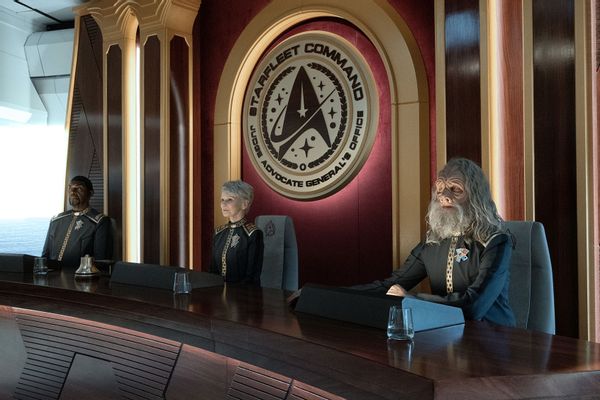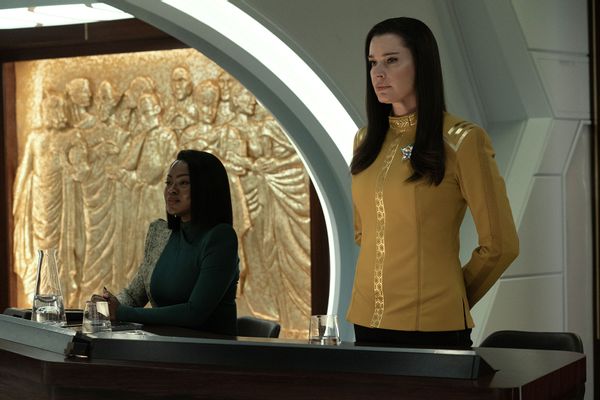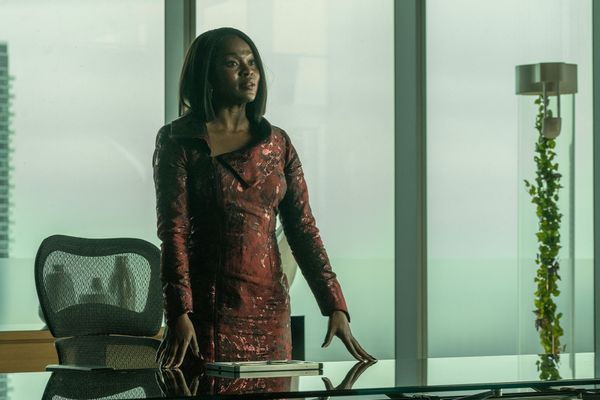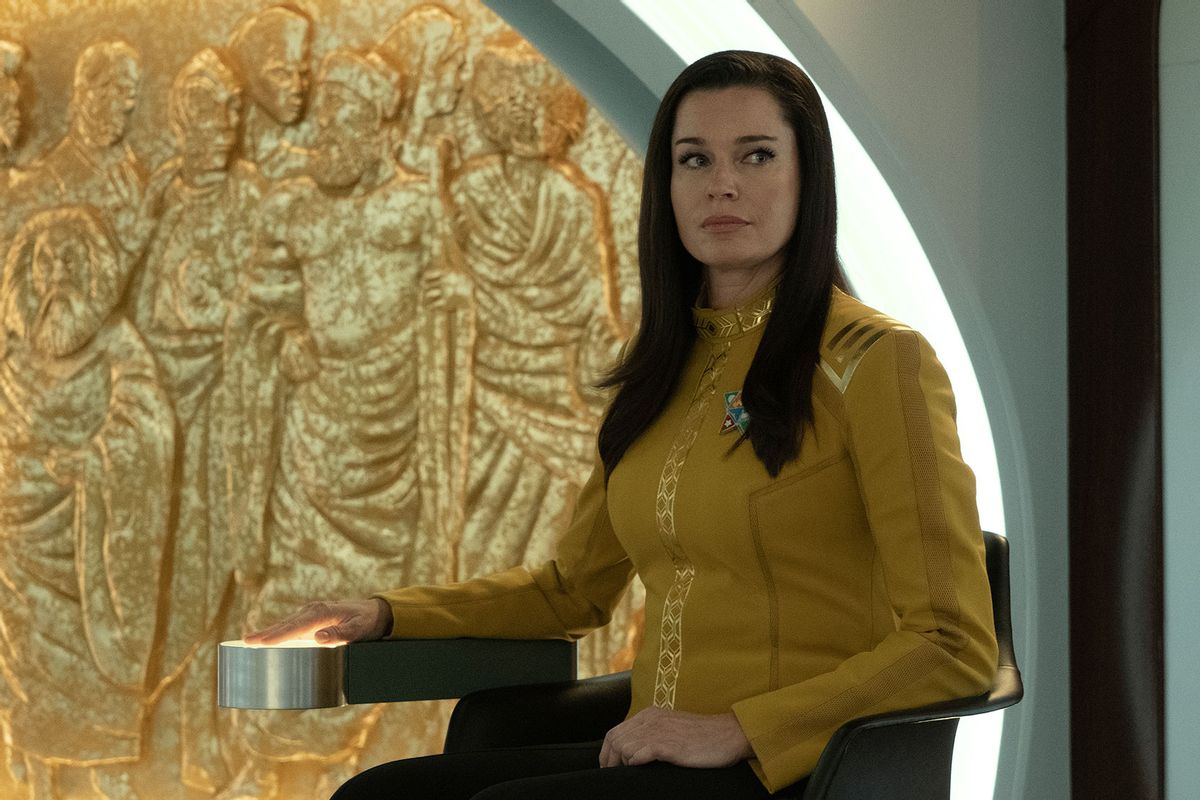Regardless of how well people think the current custodians of "Star Trek" are minding its legacy, it's tough to find fault with its casting choices – particularly "Star Trek: Strange New Worlds."
The second season's episodes highlight the crew's superb chemistry both with and apart from Anson Mount's Captain Christopher Pike. He may be the ensemble's heartbeat, but his Number One, Rebecca Romijn's Commander Una Chin-Riley, exemplifies their highest ideals.
If that wasn't clear before the events of "Ad Astra per Aspera," we know it now. Along with that, the episode reveals why Romijn, familiar to most as Mystique in the original "X-Men" movies, is a purposeful choice as Pike's second in command.
Mount has an extensive history in TV and his own connection to Marvel ("The Inhumans," "Doctor Strange in the Multiverse of Madness"), but Romijn's geek cred outstrips his by a mile. To merely employ her as a supporting player would be a waste.
But using her character as a vehicle to take on the bigotry baked into originalist interpretations of an outdated Federation law is not a turn I would have predicted.
Una's military trial in "Ad Astra per Aspera" was inevitable, set in motion in the show's third episode "Ghosts of Illyria." When a virus rips through the Enterprise crew, Una's genetically enhanced immune system fights it off and enables the medical staff to synthesize a cure.
In saving the ship, she exposes herself as an Illyrian passing as human, a serious violation of Starfleet regulation and Federation law. Genetic augmentation was banned in the 21st century following Earth's Eugenics Wars, instigated by human scientists engineering superior human beings who ended up conquering mankind. The most famous of these "Augments" was Khan Noonien-Singh, the ancestor of Enterprise security officer La'An Noonien-Singh (Christina Chong).
The Eugenics Wars are a cautionary historical example of what can happen when mankind turns its back on humanistic principles. But by banning all genetic augmentation for what it believes to be the right reasons, the Federation ended up discriminating against an entire people.
On the stand, Una recalls her own experience with persecution as a child living in a Federation colony where her family was forced to perform their cultural customs and rituals in secret.
She describes neighbors and friends being arrested, including her best friend's cousin, and the way that anti-augmentation laws encouraged people "to act on their worst impulses." The resulting civil unrest led to the local government segregating the Illyrians from the rest of the populace. Una's family chose to pass as non-Illyrian, enabling her to join Starfleet.
But that also left her in a precarious position of being found out, arrested and tried for treason, all of which comes to pass.
 Starfleet in "Star Trek: Strange New Worlds" (Michael Gibson/Paramount+)
Starfleet in "Star Trek: Strange New Worlds" (Michael Gibson/Paramount+)
One element of recent "Star Trek" chapters that I've appreciated is their willingness to question the ways the Federation and Starfleet fail to live up to their vaunted utopian strivings. Inconsistent as "Picard" could be, it handles its hero's disillusionment with Starfleet's disinclination to take responsibility for massive moral failings, and his own, quite capably.
"Star Trek" isn't in the business of following by-the-book captains, so nobody expected Pike or the Enterprise crew to turn on Una, even though her mentee La'An expresses anger at her deception when Una comes clean. But the opening moments in "Ad Astra per Aspera" show how far he's willing to go to get her the best defense, nearly succumbing to asphyxiation to prove his stubbornness when a famous Illyrian civil rights attorney Neera Ketoul (Yetide Badaki) refuses to give him an audience.
He convinces her to take the case, although Neera doesn't agree to represent Una out of empathy, especially since Neera is that best friend Una refers to in her testimony. Neera sees an opportunity for this case to change a longstanding law she views as draconian and bigoted.
It will be fascinating to see how "Ad Astra per Aspera" plays in the longer term. Within the wider "Star Trek" legacy, it continues Gene Roddenberry's tradition of holding a mirror to humanity in the present from the imagined perspective of our future selves.
Pre-"Discovery," the franchise was hesitant to confront racism directly – which isn't to say its writers were capable of doing that particularly well. The original's famously maladroit "Let That Be Your Last Battlefield," with its adversaries whose faces were painted white and black on opposite sides, is kindly remembered as well-intentioned and poorly executed.
Within the wider "Star Trek" legacy, "Ad Aspera per Aspera" continues Gene Roddenberry's tradition of holding a mirror to humanity in the present from the imagined perspective of our future selves.
At least it tried. In the main "The Next Generation" and "Voyager" were content to carry forward the first series' dedication to visible diversity. Jean-Luc Picard's Enterprise had a Black helmsman and a Klingon played by a Black actor; Captain Janeway's crew on the U.S.S. Voyager includes a Vulcan played by a Black actor and a half-Klingon played by a Puerto Rican performer, as well as an Asian operations officer and an Indigenous commander (realized problematically and for reasons unrelated to the Mexican-American actor playing him).
Among the second generation "Trek" titles, it fell to "Deep Space Nine" and Captain Benjamin Sisko, the first Black commanding officer to star in a "Star Trek" series, to specifically take on anti-Black discrimination with the sixth season episode "Far Beyond the Stars" in 1998.
"DS9" addresses prejudice in episodes prior to this, especially 1995's "Past Tense" when Sisko, Chief Medical Officer Dr. Julian Bashir, and Jadzia Dax, a humanoid alien who appears white, are accidentally zapped from their time to San Francisco 2024, where economic disparity is so extreme that the unhoused and mentally ill are warehoused in oppressive "sanctuary districts." That's where Sisko and Bashir, a North African man, are shipped while Dax, presumed to be an amnesiac white woman, is whisked away to a fancy hotel for safekeeping.
But the Brooks-directed "Far Beyond the Stars" doesn't veil its aims. Sisko hallucinates that he's a Black science fiction writer in 1953 named Benjamin Russell working for a magazine called Incredible Tales. He and a female staffer are discriminated against at work; among other slights, he's banned from taking part in a staff photo because, as his boss explains, "as far as our readers are concerned, Benny Russell is as white as they are." He's also harassed by white cops who later end up killing a friend of his and beating him.
Eventually Benny Russell is fired for writing a story about Black space station captain – Sisko — triggering a nervous breakdown that snaps him back to the presumably more equitable 24th century.
 Yetide Badaki as Neera and Rebecca Romijn as Una in "Star Trek: Strange New Worlds" (Michael Gibson/Paramount+)
Yetide Badaki as Neera and Rebecca Romijn as Una in "Star Trek: Strange New Worlds" (Michael Gibson/Paramount+)
"Ad Astra per Aspera" is not so straightforward, walking the line between "Past Tense" and "Far Beyond the Stars" by making a character played by a relatively famous white woman / former model represent a persecuted culture. Because of this I suspect its allegorical potency will be perceived as a bit too mutable. Una and other Illyrians could represent a number of marginalized populations, but not all versions of oppression take the same shape.
Want a daily wrap-up of all the news and commentary Salon has to offer? Subscribe to our morning newsletter, Crash Course.
The Illyrians' struggles are similar to those contending with the material and psychological impact of anti-trans legislation, victims of antisemitic violence or families affected by the previous administration's Muslim bans, to cite three examples. Life in her childhood colony sounds a lot like the Jim Crow South, and the local government's solution is basically a resurrection of Apartheid. It all works. Even so, when a show tries to be everything at once it risks diluting its message.
One reason this angle doesn't go terribly wrong is that Una is not the physical exemplar of Illyrians. Her people vary in appearance according to where they live; their culture modifies their bodies to adapt to their environment instead of changing the environment to suit them. But to the Federation there is no such thing as benign augmentation, making their entire population illegal, including children modified by their parents before they could consent. (The vanished Illyrian colonists the Enterprise away team was attempting to locate in "Ghosts of Illyria" tried to remove their augmentations to join the Federation, leaving them vulnerable to the virus.)
Neera points out that Una and others like her could hide who they were and enjoy the benefits of the Federation while others of her kind weren't as fortunate. She looks the part of a respectful member of Federation society.
 Yetide Badaki as Neera in "Star Trek: Strange New Worlds" (Michael Gibson/Paramount+)
Yetide Badaki as Neera in "Star Trek: Strange New Worlds" (Michael Gibson/Paramount+)
It can't be accidental that Neera and the other Illyrian in this episode (besides Una) are played by people of color. Or that two of the Starfleet personnel directly involved with the trial are portrayed by Black actors – Admiral Robert April (Adrian Holmes) and a Vulcan judge (Eugene Clark) sitting on the tribunal.
These choices signal intent rather than specifically stating it. "Slavery was once legal. Apartheid was legal," Neera says in her opening statement. "Discrimination against people for how they worshipped, how they loved, their gender, color of their skin, all legal at one time or another." One gets the sense that we're not merely meant to absorb the surface meaning of those words.
We're supposed to read the room where she cites these examples before arriving at her conclusion: A law does not make something just. "If a law is not just," she concludes, "then I ask: How are we to trust those who created that law to serve justice?"
It will be fascinating to see how "Ad Astra per Aspera" plays in the longer term.
Governments and systems, and the people who most benefit from those structures governing bodies put into place, do not easily yield to voices that question their rectitude, especially when those structures claim to represent equality and an ideal way of life.
"Strange New Worlds" is the most broadly embraced of the new "Star Trek" series because of its preservation of the original show's vision and style. With "Ad Astra per Aspera" it aspires to be bolder and wiser while shielding itself somewhat from the accusations "Discovery" sustains for supposedly making its social justice themes text as opposed to subtext.
"Ad Astra per Aspera," Una explains, translates to mean "To the stars through hardship." It was Starfleet's motto prior to the Federation; she interprets it to mean that the stars could deliver us from anything.
This episode happens to premiere right before the final weekend of 2023's Pride Month, landing in an age where those raucous celebrations we once took for granted are now defiant statements against attempts to legislate queer people out of existence. Through that lens Una's trial and vindication are a hopeful bridge from our time to a future that believes it has learned from this era's ignorance and still has some distance to travel for that to be true.
New episodes of "Star Trek: Strange New Worlds" stream Thursdays on Paramount +.
Read more
about "Star Trek"

Shares